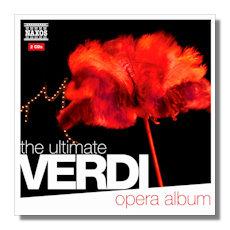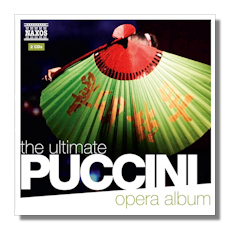
The Internet's Premier Classical Music Source
Related Links
-
Puccini Reviews
Verdi Reviews - Latest Reviews
- More Reviews
-
By Composer
-
Collections
DVD & Blu-ray
Books
Concert Reviews
Articles/Interviews
Software
Audio
Search Amazon
Recommended Links
Site News
 CD Review
CD Review
Ultimate Opera Albums

Giuseppe Verdi
- La Traviata
- Prelude 2
- Brindisi, Libiamo ne' lieti calici 1,2,a,b
- E' strano! e' strano! 2,a
- Follie!… Sempre libera 2,a,b
- Un di, felice, eterea 2,a,b
- Di Provenza il mar, il suol 2,o
- Lunge da lei per me non v' ha diletto! 2,b
- Rigoletto
- La donna è mobile 2,b
- Bella figlia dell' amore 2,b,e,f,g
- Gualtier Maldè… Caro Nome Che Il Mio Cor 1,2,e,l,m
- Questa o quella 2,b
- Ella mi fu rapita!… Parmi veder le lagrime 2,b
- Il Trovatore
- Tacea la notte placida…Di tale amor 4,c,d
- Di tale amor che dirsi 4,c,d
- Di quella pira 4,d,i,j
- Vedi! le fosche notturne spoglie "Anvil Chorus" 4,8
- D'amor sull' ali rosee vane 4,d
- La Forza del Destino
- Overture 6
- Pace, pace, mio Dio 5,h
- Qual sangue sparsi 9,q
- Aïda
- Gloria all' Egitto 1,3
- Se quel guerrier io fossi!… Celeste Aida 7,n
- Qui Radames verrà!… O Patria mia 7,p
- Macbeth - Patria oppressa! 1,3
- Nabucco - Va, pensiero "Chorus of the Hebrew Slaves" 1,3
- Otello - Mia madre aveva una povera ancella… Piangea cantando… Ave Maria 5,m
- Un ballo in maschera - Forse la soglia attinse 9,q
- Ernani - Ernani, involami 10,r
a Monika Krause, soprano
b Yordy Ramiro, tenor
c Zsuzsa Csonka, soprano
d Daniela Longhi, soprano
e Alida Ferrarini, soprano
f Jitka Saparova, contralto
g Eduard Tumagian, baritone
h Miriam Gauci, soprano
i Maurizio Frusoni, tenor
j Josef Mukk, tenor
k Peter Subert, baritone
l Jozef Abel, tenor
m Robert Szucs, bass
n Kristjan Johannson, tenor
o Georg Tichy, baritone
p Maria Dragoni, soprano
q Janez Lotric, tenor
r Marina Mescheriakova, soprano
1 Slovak Philharmonic Chorus
2 Slovak Radio Symphony Orchestra/Alexander Rahbari
3 Slovak Radio Symphony Orchestra/Oliver Dohnányi
4 Hungarian State Opera Orchestra/Will Humburg
5 Belgian Radio & Television Philharmonic Orchestra/Alexander Rahbari
6 Hungarian State Opera Orchestra/Pier Giorgio Morandi
7 Ireland National Symphony Orchestra/Rico Saccani
8 Budapest Festival Chorus
9 Ukrainian National Opera Symphony Orchestra/Johannes Wildner
10 Slovak Radio Symphony Orchestra/Michael Halász
Naxos 8.578068-69 2CDs


Giacomo Puccini
- La Bohème
- Che gelida manina 1,b
- Si, mi chiamano Mimì 1,a,b
- O soave fanciulla 1,a,b
- Quando m'en vo' soletta "Musetta's Waltz" 1,a
- Donde lieta uscì 1,a
- Dunque è proprio finita? 1,a
- Manon Lescaut
- Donna non vidi mai 4,d
- Intermezzo 5
- In quelle trine morbide 5,e
- Oh, sarò la più bella! 5,g
- Sola, perduta, abbandonata 5,e
- Madama Butterfly
- Humming Chorus 2,3
- Un bel dì vedremo 3,e
- Viene la sera…Bimba dagli occhi pieni 3,h,i
- Turandot
- Signor, ascolta! "Riddle Scene" 1,a
- Non piangere, Liù 1,a
- Ah! per l'ultima volta! (Act 1 Finale) 1,a
- Tu, che di gel sei cinta 1,a
- Nessun dorma 4,d
- Tosca
- E lucevan le stelle 3,f
- Vissi d'arte, vissi d'amore 3,c
- Recondita armonia 3,j,k
- Non la sospiri la nostra casetta 3,f
- Ah, Quegli Occhi! 3,f
- Tre sbirri, una carrozza…Te Deum 3,f
- Gianni Schicchi - O mio babbino caro 1,a
- La Rondine - Ch'il bel sogno di Doretta 1,a
- Le Villi - Se come voi piccina 5,e
- Edgar - Act 3 Prelude 6
- Suor Angelica - Senza mamma, o bimbo, tu sei morto 5,e
a Luba Orgonasova, soprano
b Jonathan Welch, tenor
c Nelly Miricioiu, soprano
d Thomas Harper, tenor
e Miriam Gauci, soprano
f Giorgio Lamberti, tenor
g Kaludi Kaludov, tenor
h Nelly Boschkowa, mezzo soprano
i Yordy Ramiro, tenor
j Giorgio Lamberti, tenor
k Jozef Spacek, bass
1 Slovak Radio Symphony Orchestra/Will Humburg
2 Slovak Philharmonic Choir
3 Slovak Radio Symphony Orchestra/Alexander Rahbari
4 Slovak Radio Symphony Orchestra/Michael Halász
5 Belgian Radio and Television Philharmonic Orchestra/Alexander Rahbari
6 Slovak Radio Symphony Orchestra/Ondrej Lenárd
Naxos 8.578066-67 2CDs
There's obviously a lot to decipher on this pair of double-disc sets. Most of the tracks listed above are taken from complete opera performances, Nessun dorma being one exception. Some of the numbers therefore feature lead-in music, or other vocal music within the aria, not usually heard on solo albums. If I recall correctly, most of the complete opera performances these discs were derived from received reasonably positive reviews. Conductor Alexander Rahbari, a Karajan protégée, has quite a lot of experience in the opera pit and his readings here are generally convincing. He is the conductor on twenty-nine tracks of the forty-nine on these Verdi and Puccini albums. Will Humburg, Pier Giorgio Morandi and the others also have a good grasp on the music they conduct.
Opera aficionados often tend to avoid so-called "highlights" discs like these, but those interested in this kind of presentation won't be disappointed. Individual arias and ensemble numbers can often stand alone convincingly, whereas in the complete opera recording they may not fit as well, especially if the overall performance is inconsistent or weak. Here, mostly everything is skillfully performed.
Let me deal first with the Verdi album. The famous Brindisi, Libiamo ne' lieti calici, is spirited and full of color. Kudos to the two principals here, Monika Krause and Yordy Ramiro. Ramiro's La donna è mobile is full of character in its whimsicality and bouncy rhythms, though one wishes he had been a bit closer to the microphone.
Krause delivers her La Traviata numbers with a fine dramatic sense, especially E' strano! e' strano!, where she is able to float such lovely soft notes so beautifully. While some of her upper notes in Follie!… Sempre libera come across as a little strained, she nevertheless sings the music with astonishing virtuosity.
Daniela Longhi has a warmer voice, though when she belts she can be a tad over-the-top, as in her mostly beautifully-sung Tacea la notte placida, from Il Trovatore. Miriam Gauci delivers a lovely Ave Maria, from Otello, demonstrating that she is a sensitive and subtle artist.
The one singer on the Verdi album who may be the most intriguing is tenor Kristjan Johannson. Listening to his Celeste Aida, I couldn't help but notice the similarity of his voice to that of the late Luciano Pavarotti. His account of this famous aria did not quite rise to the Pavarotti level, but it wasn't far below. Johannson has a rich, powerful tenor voice that most listeners will find pleasing.
Maria Dragoni delivers an intense performance of O Patria mia, from Aida. Her lovely voice exudes a true sense of tortured and conflicted emotions, qualities so necessary to bring off this beautiful aria.
Though I haven't commented on many of the other items here, suffice it to say that most are also convincing. The orchestral performances are good and the sound generally clear and powerful.
On the Puccini album, performances are also generally good. Luba Orgonasova appears on a number of tracks, including the leadoff one, Ch'il bel sogno di Doretta, from La Rondine. Here she does reasonably well, but her Si, Mi chimano Mimi, from La Boheme, was outstanding, her voice not coming across as too penetrating or over-miked, as in the first number. She has one of those powerful, Slavic soprano voices, like that of the Bulgarian operatic star Ghena Dimitrova. Orgonasova's duet with Jonathan Welch in O soave fanciulla, from La Boheme, shows the two in good form in their give-and-take delivery. Orgonasova's Quando me"n vo is quite lovely, if a little quirky in some of the phrasing.
Miriam Gauci also appears on the Puccini album in several numbers. In the famous pair of arias In quelle trine morbide, from Manon Lescaut, and Un bel di, from Madama Butterfly, she pours out her soul, giving perhaps her finest performances on either album.
Tenor Giorgio Lamberti's E lucevan le stelle, from Tosca, is appropriately dark and fully convincing, and his Recondita armonia is beautifully sung, if a little short on passion.
Nelly Miricioiu's Tosca numbers show her lighter voice as perfectly appropriate, especially in the lovely duet Ah, quegli occhi, with Lamberti.
Thomas Harper's Nessun dorma, from Turandot, was beautifully sung and quite powerful, even if some of his notes sound slightly clipped, slightly staccato-like. Again, the orchestral performances are very good throughout and the sound generally excellent. Well, there you have it. Both discs are excellent of their kind and worth the attention of anyone interested in a collection of highlights from the popular operas by this pair of iconic composers.
Copyright © 2011, Robert Cummings





















